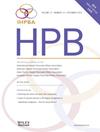The impact of obesity on in-hospital outcome of patients who underwent hepatic resection surgeries; a US national-wide study
IF 2.4
3区 医学
Q2 GASTROENTEROLOGY & HEPATOLOGY
引用次数: 0
Abstract
Background
Previous studies have shown conflicting results on the effect of obesity on the outcome of liver resection. The current study investigates the impact of obesity in these patients.
Methods
We included all the patients with hepatobiliary cancer who underwent liver resection between 2016 and 2020 using the International Classification of Diseases, 10th Revision, Procedure Coding System (ICD-10-PCS) codes. A propensity score matching analysis was performed to match obese and non-obese groups.
Results
A total of 8,731 patients were included in the study. The trend of obesity increased significantly from 14.6% in 2016 to 19.0% in 2020. After PSM, obesity was independently associated with increased odds of mechanical ventilation (OR: 1.82, 95% CI: 1.30-2.56, p-value<0.001), acute kidney injury (OR: 1.31, 95% CI: 1.04-1.65, p-value=0.023), and vasopressor need (OR: 2.11, 95% CI: 1.32-3.38, p-value=0.002). However, rates of blood transfusion, surgical site infection, pneumonia, sepsis, postoperative delirium, bowel obstruction, cardiac arrest, deep vein thrombosis/pulmonary thromboembolism, ileus, nausea and vomiting, postoperative anemia, post-procedural shock, and in-hospital mortality did not differ significantly between groups. The hospitalization costs were higher in the obese group ($28,272 [19,516-40,842] vs. $26,402 [18,099-37,810], p-value<0.001, respectively).
Conclusion
Obesity is linked to higher postoperative complications and hospitalization costs after hepatectomy.

肥胖对肝切除术患者住院预后的影响一项美国全国性的研究。
背景:先前的研究显示肥胖对肝切除术结果的影响存在矛盾。目前的研究调查了肥胖对这些患者的影响。方法:采用国际疾病分类第十版程序编码系统(ICD-10-PCS)编码纳入2016 - 2020年所有行肝切除术的肝癌患者。对肥胖组和非肥胖组进行倾向评分匹配分析。结果:共纳入8731例患者。肥胖趋势从2016年的14.6%显著上升到2020年的19.0%。PSM后,肥胖与机械通气几率增加独立相关(OR: 1.82, 95% CI: 1.30-2.56, p值)。结论:肥胖与肝切除术后较高的术后并发症和住院费用相关。
本文章由计算机程序翻译,如有差异,请以英文原文为准。
求助全文
约1分钟内获得全文
求助全文
来源期刊

Hpb
GASTROENTEROLOGY & HEPATOLOGY-SURGERY
CiteScore
5.60
自引率
3.40%
发文量
244
审稿时长
57 days
期刊介绍:
HPB is an international forum for clinical, scientific and educational communication.
Twelve issues a year bring the reader leading articles, expert reviews, original articles, images, editorials, and reader correspondence encompassing all aspects of benign and malignant hepatobiliary disease and its management. HPB features relevant aspects of clinical and translational research and practice.
Specific areas of interest include HPB diseases encountered globally by clinical practitioners in this specialist field of gastrointestinal surgery. The journal addresses the challenges faced in the management of cancer involving the liver, biliary system and pancreas. While surgical oncology represents a large part of HPB practice, submission of manuscripts relating to liver and pancreas transplantation, the treatment of benign conditions such as acute and chronic pancreatitis, and those relating to hepatobiliary infection and inflammation are also welcomed. There will be a focus on developing a multidisciplinary approach to diagnosis and treatment with endoscopic and laparoscopic approaches, radiological interventions and surgical techniques being strongly represented. HPB welcomes submission of manuscripts in all these areas and in scientific focused research that has clear clinical relevance to HPB surgical practice.
HPB aims to help its readers - surgeons, physicians, radiologists and basic scientists - to develop their knowledge and practice. HPB will be of interest to specialists involved in the management of hepatobiliary and pancreatic disease however will also inform those working in related fields.
Abstracted and Indexed in:
MEDLINE®
EMBASE
PubMed
Science Citation Index Expanded
Academic Search (EBSCO)
HPB is owned by the International Hepato-Pancreato-Biliary Association (IHPBA) and is also the official Journal of the American Hepato-Pancreato-Biliary Association (AHPBA), the Asian-Pacific Hepato Pancreatic Biliary Association (A-PHPBA) and the European-African Hepato-Pancreatic Biliary Association (E-AHPBA).
 求助内容:
求助内容: 应助结果提醒方式:
应助结果提醒方式:


